Over the years, VPN has become one of the primary tools for privacy on the Internet, helping you to safely browse the web without the fear of being monitored by your ISP, Government agencies, or third-party entities. They have a wide spectrum of uses for protecting your privacy, including; while roaming, connecting to public Wi-Fi hotspots, streaming, and torrenting.

While there are a lot of established VPN products in the market right now, most of them may seem a little pricey, especially when there are enough free options available. But free VPNs usually aren’t recommended due to prevalent privacy, security, and performance issues.
KeepSolid VPN Unlimited is one of the VPN providers that got our attention due to its competitive long-term pricing plans. But how does it hold up against the already established players in the market? Let’s find out.
Note: Before we begin, here’s a little bit about the company. KeepSolid is a New York-based corporation established in 2013, which expertises in creating “modern security and productivity solutions for corporate and personal use”. We have previously reviewed their affordable SmartDNS solution called KeepSolid SmartDNS. Check it out here for more details.
Setup & Controls
KeepSolid likes to keep the user controls as simple and essential as possible. But, if you want to customize your experience, you wouldn’t feel left out too.
Initial Setup
You can download VPN Unlimited directly from the official website, and you need to register using your email address to start using the service. If you already have an existing KeepSolid account, you can log in using the same ID. KeepSolid lets you try out VPN Unlimited for 7 days without having to add a payment method on file. The no-commitment trial gives ample time to test it out and decide whether to purchase a full license or not.
UI Controls
Once you’ve downloaded and activated the VPN service, you’re presented with a simple UI. At the top, you see a map of the world with a pin representing your current location, as determined by your IP address. Below the map, you’ll find a prominent Power button to switch the VPN on or off. Below that, there’s a drop-down menu that lists VPN server locations, including some optimized for streaming services.
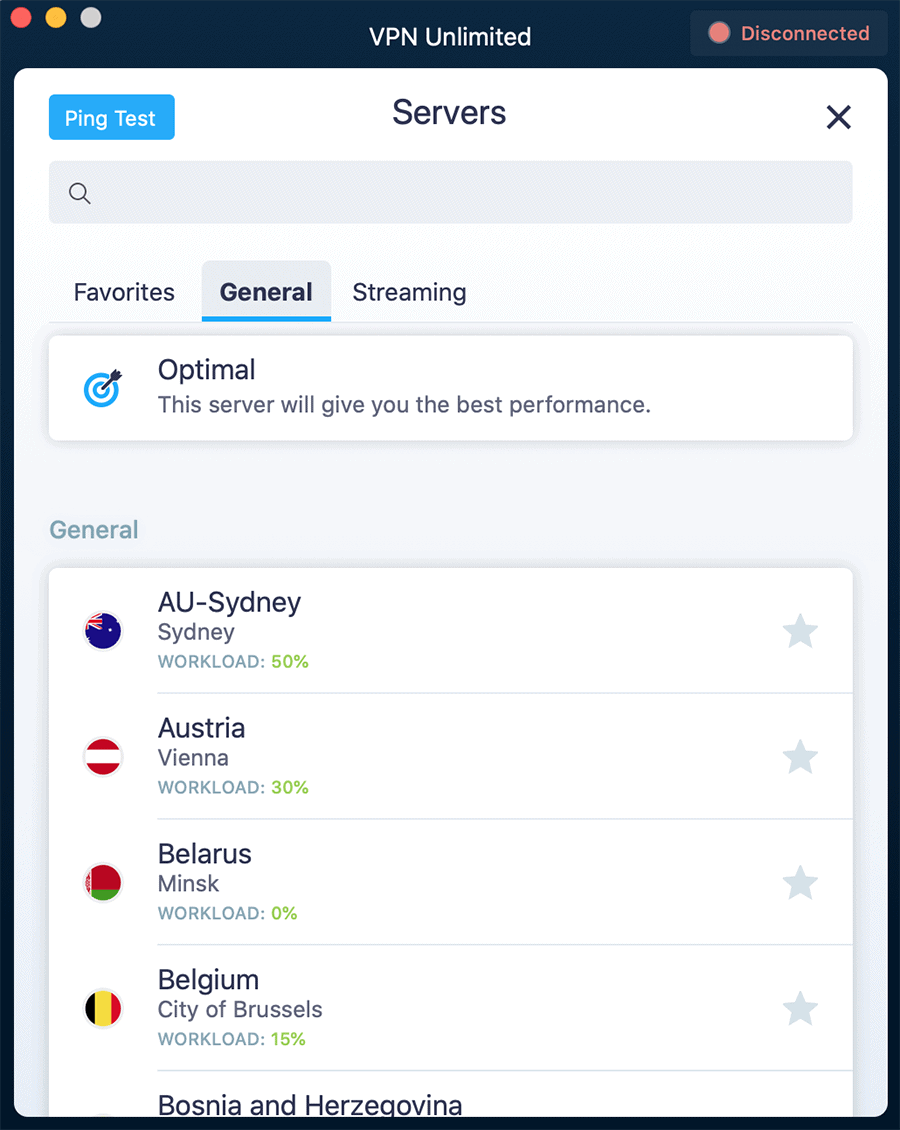
Server Load Indicator: The server list also indicates how much workload a particular VPN server is currently handling. A heavier load on a server may be better for privacy, but on the other hand, the peak performance may be hindered. You can pick and choose a server as per your convenience, depending on the situation. Users generally tend to avoid the servers with more workload, and most of the time, this results in an automatic load balancing situation.
Native Ping Test Tool: Ping time indicates the time taken for a client request to reach the server and back. A longer ping time is usually associated with more latency, which could affect your experience in activities such as gaming, video conferencing, etc. If latency a concern for you, VPN Unlimited’s built-in Ping Test tool helps you simultaneously check ping times on all the available servers.
Together, the server load indicator and the ping test tool might help you to select a VPN server that offers good performance without significant lag.
Optimal Server Selection: Apart from manual selection, VPN Unlimited provides an “Optimal” server selection, which automatically selects a server with optimal performance and speed, based on your current location, the workload on the server, and the VPN protocol selected. If VPN performance is your primary concern, selecting the optimal server should pick the right server for you most of the time.
Clicking on the Main Menu takes you to the “My Account” section, where you can subscribe to a particular VPN Unlimited Plan, or purchase extras, such as a Personal Server, a Personal IP, or additional slots for your devices. In the Settings page, you can select your preferred VPN protocol, set up DNS Firewall, enable or disable the Kill Switch feature (on limited platforms and VPN protocols), disable the VPN on Trusted Networks, install/remove the VPN profile, configure the VPN client to run at startup, and more.
In the below section, we’ll explore various features of VPN Unlimited in detail.
Features of VPN Unlimited
Location Coverage: Location support is a key factor for a VPN. But different VPN services market their location coverage in different ways; some emphasize on the number of servers, some highlight how many locations or cities they have servers in, while others advertise how many countries they span. But as a user, it’s important to understand what really matters in terms of location coverage.
A larger number of servers usually implies that the VPN service has a significant user base, i.e., it needs more servers to handle the network activity. Increasing the number of servers rapidly at a rate higher than the growth of the user base doesn’t bring any significant advantages for a VPN service that has a relatively smaller user base. Rather, it would increase the operational costs for the service, which could eventually trickle down to the users’ subscription fees.
Location support matters more than the number of servers. A better location coverage provides the user with more options as per the requirements. But, the proportional distribution of available server locations across more countries is also equally important.
Another important factor that impacts VPN experience is based on the actual location of the servers. Some VPN services advertise more location coverage by deploying virtual servers in advertised locations, which differs from the actual location of the servers. Virtual server locations can lead to worse than expected performance and reliability for a VPN service.
As of this writing, NordVPN claims to have over 5100 servers in 59 countries, while ExpressVPN claims to have 3000+ servers across 160 locations spanning 94 countries. On the other hand, VPN Unlimited provides 500+ high-speed VPN servers across 80 locations spanning 55 countries around the world.
While the number of servers might seem low with respect to the competition, it should not be a concern for the user, given that most of its servers currently operate at less than 60% capacity. And, the company is always adding new servers as per the demand, while striking a good balance between infrastructure utilization and the operational costs.
Our ping tests also suggested that the VPN servers are located at their advertised locations, and virtual servers are likely not involved.
Note: Based on our tests, VPN Unlimited is currently blocked in most of the locations within Mainland China, as is the case with most other global VPN services. The company says that it is working on resolving the situation in the next few months, and we’ll update the article if and when the situation changes in the future. But if you’re using the VPN service outside of China, this shouldn’t be a concern for you.
Dedicated servers for Streaming & Torrenting: KeepSolid VPN Unlimited offers dedicated servers optimized for specific activities like streaming and torrenting. The company lists specific streaming services, including Netflix, Amazon Prime Video, Disney+, HBO Now, BBC iPlayer, and more. Selecting one of these services automatically connects you to one of the VPN servers optimized for the service. Although, manually selecting VPN servers from specific locations on the list work just fine for unblocking the respective streaming services as well.
The same cannot be said for torrenting, though. VPN Unlimited only supports P2P on 5 servers as of now; if you’re connected to any other server, you won’t be able to upload or download data via torrent clients. To find the torrent-friendly servers, you need to head over to your KeepSolid VPN configuration page, find the server labeled as “[Torrents]” on the drop-down list, and come back to the official VPN client and select the same server from the list. Alternatively, you can also Generate a specific VPN configuration based on the device, server, and protocol, and manually set up KeepSolid on any supported VPN clients like OpenVPN.
Parallel Device Support: VPN Unlimited Premium plans include access to 5 or 10 simultaneous client installations (including browser extensions), depending on the plan. If you need an additional “slot”, you can purchase it as an add-on. Alternatively, you can delete one of your existing devices to free up one of the available slots, and add the new device. Although, there’s a limitation on the number of slots you can release; the company only allows you to free up one existing slot within a week.
Platform Support: VPN Unlimited provides native clients for a wide range of platforms, including Windows, macOS, Linux, iOS, Android, and more. It can even be configured on certain routers and streaming devices.
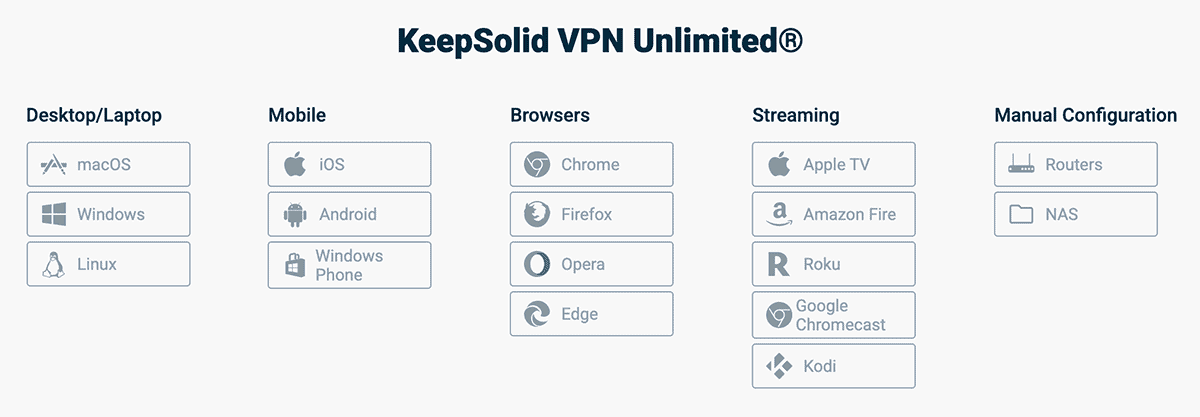
Additional features: VPN Unlimited includes a DNS Firewall that you can optionally use to configure specific web-filtering on your devices to block certain types of websites and content. Setting up the firewall is easy; you can choose to block content from a pre-configured list of content types, or set up your own domain-specific blacklist (or whitelist). The DNS Firewall is co-dependent on VPN Unlimited and requires the VPN service to be enabled in order to function.
KeepSolid VPN Unlimited also has some unique perks of its own. For instance, you can opt for a dedicated personal server or a static IP address for an additional monthly fee.
VPN Unlimited normally rotates user IP addresses on every session. Although this is good for privacy, it could often result in you having to re-authenticate yourself every time into various online websites and services due to the change in session IP.
VPN-based Static IPs let you securely log into websites and services by whitelisting a trusted IP address, regardless of your location or ISP. This means you could use secure log in to access online services while roaming, over cellular data, or even on public Wi-Fi hotspots.
Performance & Security
Speed (Bandwidth): VPN Unlimited offers unlimited usage with no monthly data caps. However, according to KeepSolid, all of their servers support a maximum connection speed of 10Gbps, with an average speed of 1Gbps per server. Connection speeds may vary depending on the client and server locations, VPN protocol used, and the client’s Internet connection.
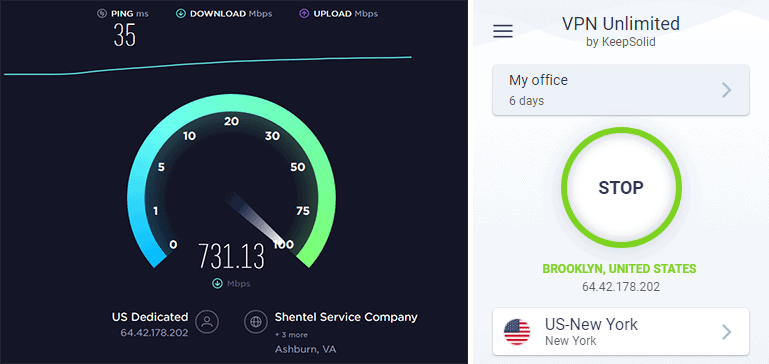
In our tests conducted on various network connection speeds, ranging between 40Mbps and 1Gbps, we could establish stable and reliable connections, almost reaching expected connection speeds (up to 750Mbps) with the VPN servers across different locations. The lowest ping was recorded at 30ms from our test location.
The streaming performance was also quite decent for services such as Netflix US, Disney+, Amazon Prime, and BBC iPlayer. In our tests, the services streamed just fine without noticeable lag.
Encryption Type: VPN encryption secures the communication between your client device and the VPN server in a way that can’t be exploited by third-party entities. Generally, a military-grade AES encryption is considered as a strong encryption standard that is used by banks and other secure institutions. VPN Unlimited enables you to securely connect to the Internet through a military-grade AES 256-bit encrypted tunnel.
VPN Protocols: Since different VPN protocols implement different key-exchange mechanisms, there’s usually a certain trade-off between the speed and security of VPN protocols in general. In most cases, though, the trade-off is negligible.
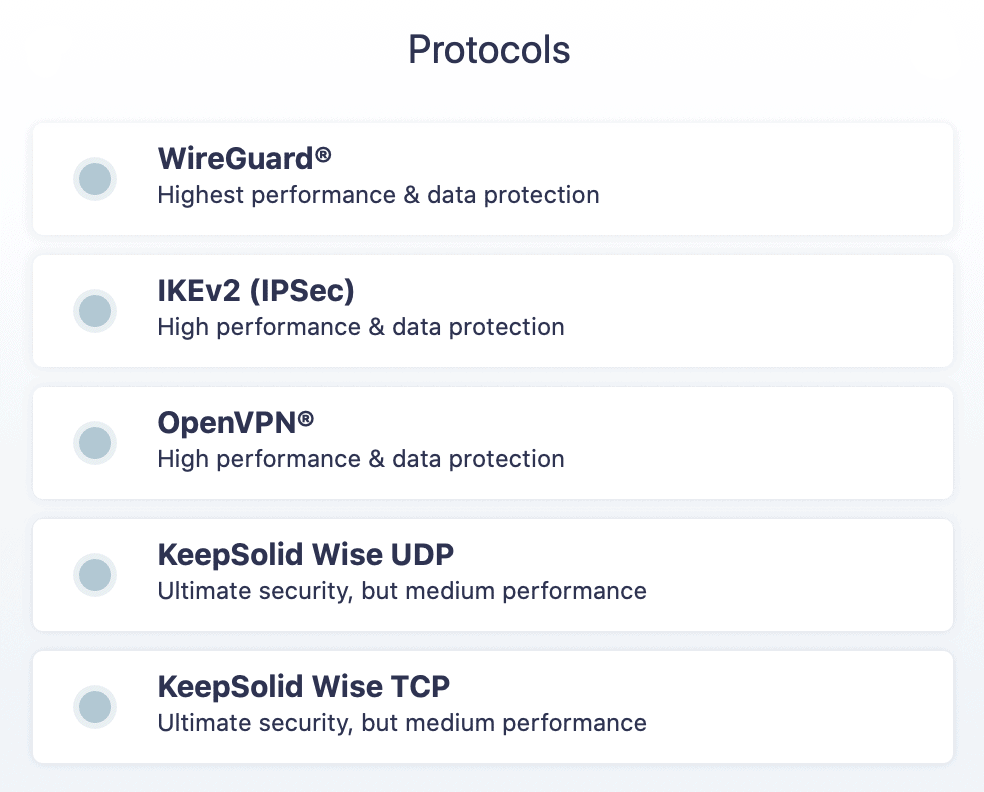
VPN Unlimited supports 3 industry-standard secure VPN protocols, including OpenVPN on UDP, IPSec over IKEv2, and the more recent WireGuard protocol. In all of the protocol implementations, VPN Unlimited uses military-grade 256-bit AES encryption, ensuring protection against attacks from outside the encrypted tunnel.
OpenVPN still remains the gold-standard of VPN protocols, with a tried and tested secure implementation that does not compromise much on performance. IKEv2 is the next-generation key-exchange protocol for IPSec and provides better security, accessibility, and connection stability compared to IKEv1.
WireGuard is a relatively new protocol that is optimized for performance and security. With less than 4,000 lines of code, its implementation can be audited by a single person within a few hours. And if required, major changes can safely and easily be implemented to the protocol. Compared to that, OpenVPN, together with OpenSSL (on which the protocol is based on) has a combined codebase of more than 600,000 lines and would require a dedicated team multiple days to audit. IPSec’s code is also bulky, around 400,000 lines of code.
KeepSolid is one of the few VPN providers to implement the WireGuard protocol into their solution. WireGuard just recently came out of beta and is under active development. Although its code optimization makes it possible to support high speeds without compromising on the security, the protocol’s current implementation does have some glaring privacy issues. KeepSolid, like some of the other VPN providers that implement the protocol, uses workarounds within their implementation to mitigate these issues.
In addition to the 3 standard protocols, VPN Unlimited also supports the company’s exclusive KeepSolid Wise protocol, which is built on top of the OpenVPN protocol using the TCP 443 and UDP 33434 ports, making it difficult to detect and block.
Privacy
Most VPN services claim to protect your privacy while browsing the Internet, but they do have the capability to log your Internet activity. The privacy of a VPN is built on the foundation of a strong privacy policy, which includes a strict no-log approach. The governing laws of the country, where the VPN company is based out of, also play a key role in privacy enforcement.
So, while there’s technically no way to prove that a VPN logs user activity or not, historic incidents of subpoena enforced by authorities or audit reports on specific VPNs can throw some light on their actual logging practices.
No-Log Policy: According to KeepSolid, the company follows a strict no-log policy to preserve the confidentiality of users’ private data. As per company policy, VPN Unlimited does not collect and retain any personally identifiable information from its users. This includes the data transferred over the network during an active VPN session, including browsing history, connection times, metadata, downloads, server usage, data content, etc.
As of now, there are no audit reports publicly available to verify their zero-log claim; we’ll update this article as and when new information becomes available.
To ensure proper working of the VPN, the service needs to store the users’ IP addresses temporarily in memory. This information is deleted as soon as the user session is terminated. The company says it further rotates IP addresses in each VPN session. This helps in circumventing the privacy issues of the WireGuard protocol.
According to a KeepSolid representative, “The data is transmitted via the protected TLS channel and it is deleted when switching the servers. When the user uses manual settings, his IP is not transmitted at all. After the user logs out all data is deleted after 7 days if there is no activity or connecting to a different server. The data [includes] internal IP addresses, external IP addresses, and [the] user public key.”
You can check out KeepSolid’s Privacy Policy and Data Usage Regulations for more details.
Privacy policy aside, KeepSolid also implements some technical measures to protect private information from accidental leakage.
IP Leak Protection: When you’re connected to a VPN, all of the traffic is ideally routed through its encrypted network. But unless you’re using a reliable VPN service, it’s still possible that your real IP may be exposed to third-party entities, in spite of a no-log policy. There are various ways in which the users’ actual IP addresses may be revealed while using a VPN; these include accidental leaks during unintentional disconnections, DNS leaks, WebRTC leaks, IPV6 leaks, etc., to name a few common ones.
VPN Kill Switch: When there is a sudden drop in network connection while using VPN, the client device may default back to the ISP-provided IP address, thus risking exposure of the users’ identity. VPN Unlimited supports a Kill Switch feature that automatically terminates all network connections in such situations. Doing so prevents your device from defaulting back to its public IP address, thus protecting users from the risk of accidental exposure.
Note: As of now the VPN Kill Switch feature is available across all VPN protocols on the Android client. On other platforms, VPN Unlimited currently supports Kill Switch only with IKEv2 / IPSec protocol.
DNS Leak Protection: When a device is connected to a VPN, DNS queries are usually routed directly through the VPN servers, preventing possible DNS leakage. However, on modern Windows systems, DNS queries are resolved simultaneously through all available network channels, to facilitate faster domain name resolutions. A potential downside of this approach is that DNS calls may sometimes be made outside of the VPN network, thereby possibly exposing the user’s IP. A decent VPN service, including VPN Unlimited, implements suitable DNS leak protection mechanisms to prevent such leaks.
WebRTC Leak Protection: WebRTC stands for Web Real-Time Communication, which is an open-source standard of P2P communication between browsers, without any external dependency. The most common example of WebRTC implementation is video conferencing, where you can directly use your device’s camera and microphone inside the web browser for real-time communication.
WebRTC is often used in websites to enhance communications, but they can also expose your real IP address. You can manually disable WebRTC in your browser settings to protect against such leaks. Alternatively, you can use third-party browser extensions to block WebRTC leaks.
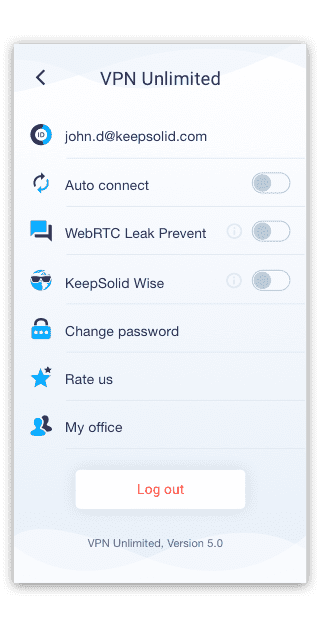
Apart from third-party browser extensions, the company recommends using its official browser extensions for Chrome, Firefox, Edge, or Opera to experience improved WebRTC leak protection, automatic VPN connectivity at browser launch, and a few other features.
Torrent IP Leak Protection: IP Leak may also happen while downloading torrents over a P2P network. VPN Unlimited offers protection against torrent address detection on its P2P supported servers.
You can find out whether your VPN connection is protected against various types of IP leaks, by running an IP leak test.
Pricing
To run a reliable and sustainable VPN service, companies need to charge the users a subscription fee that helps to cover maintenance costs associated with its operations. Thus, a free VPN service, although attractive at first glance, may not be reliable in terms of privacy and security.
When you register and activate VPN Unlimited, you get a 7-day free trial during which you get to try out all the features. Post the trial period, you need to choose a subscription to continue using the service. A monthly subscription will cost you $9.99 a month for 5 client slots and $14.99 for 10 client slots. But you can save more if you opt for a 1-year or 3-year plan. The 1-year plan is priced at $59.99 (effectively $5.00 per month) for 5 slots and $89.99 (effectively $7.50 per month) for 10 slots, while the 3-year plan usually costs $99.99 (effectively $2.78 per month) for 5 slots and $149.99 (effectively $4.17 per month) for 10 slots. There is also a Lifetime plan usually available for a single payment of $199.99 for 5 slots and $299.99 for 10 slots.
KeepSolid also runs limited-time deals and promotions throughout the year, making VPN Unlimited available at discounted rates as low as $1.39 per month.
Other extras, such as additional client slots, private static IP, or a personal server is also available on a need basis via in-app purchases.
VPN Unlimited’s pricing is quite reasonable with respect to the competition. ExpressVPN, one of the top VPN providers in the market costs $6.67 per month billed for 15 months in their most affordable plan. NordVPN, another popular competitor, costs $3.49 per month for the 3-year plan.
Although the Lifetime plan may seem attractive, keep in mind that you’re effectively paying upfront for a 2x 3-year plan (up to 6 years subscription) to enjoy the lifetime benefits. And in this ever-changing landscape, there’s no way to be certain if the service would be best for you six years down the line, or if they would even remain in business by that time.
If you’re a corporate user looking for business-friendly plans, VPN Unlimited offers customized Teams pricing too.
Help & Support
If you run into any problem while using VPN Unlimited, the official support pages contain extensive documentation about the product that should resolve most of the common issues.
If you’re facing an issue specific to your account, or something that isn’t covered in the documentation, you can reach out to the team via 24/7 Live Chat & Email Support channels. KeepSolid has been maintaining a responsive email support team that usually replies within the hour.
Is KeepSolid VPN Unlimited for you?
VPN Unlimited offers the convenience, security, and privacy features that you normally expect from a good VPN service. It’s also one of the few VPN providers to integrate the new WireGuard protocol into their official clients across all platforms, including iOS and Android.
All this is available for an affordable price; KeepSolid offers one of the cheapest (if not the cheapest) rates in the market, especially with its long-term plans, which should appeal to many first users and privacy enthusiasts willing to pay for a VPN service.
However, if you’re specifically looking for services which have been independently audited, have historical subpoena reports, support true anonymous payment methods, or include features like split-tunneling, DNS running on VPN servers, more P2P-supported servers, etc., you might have to look for other alternatives.
Since VPN Unlimited gives you a 7-day free trial without any limitation, you should have just enough time to take it for a spin and decide whether the product is right for you.